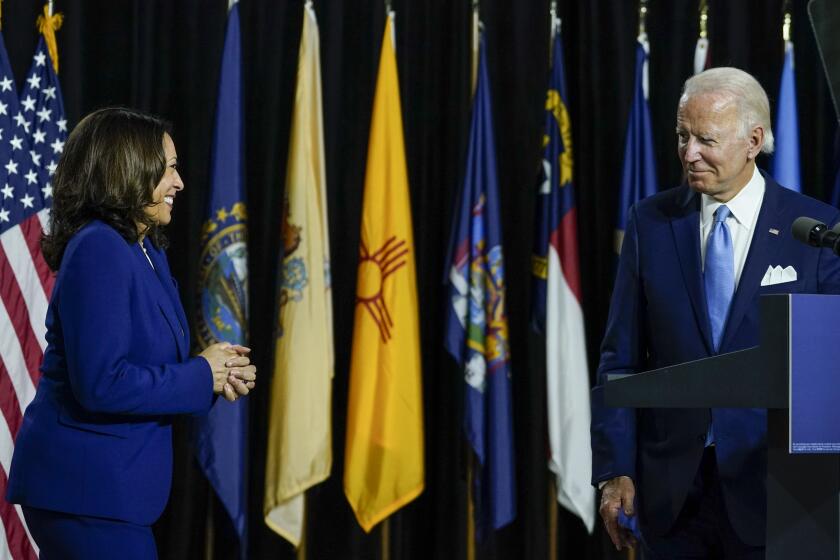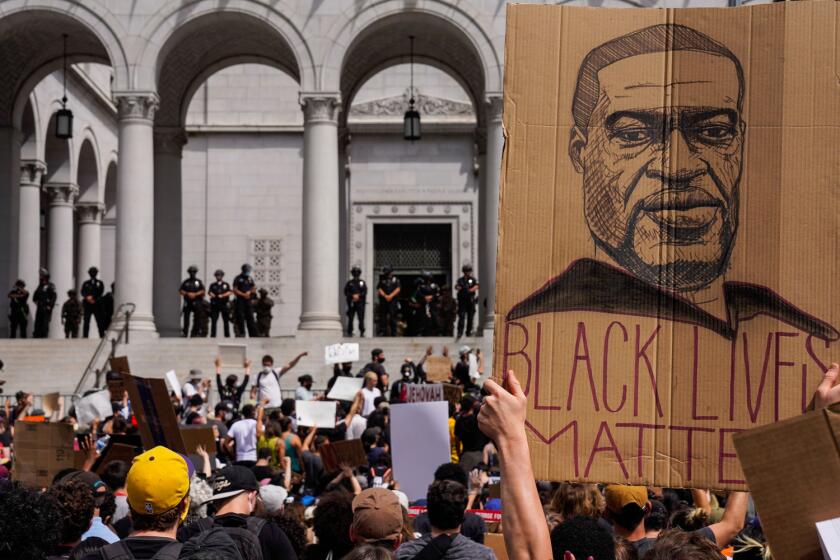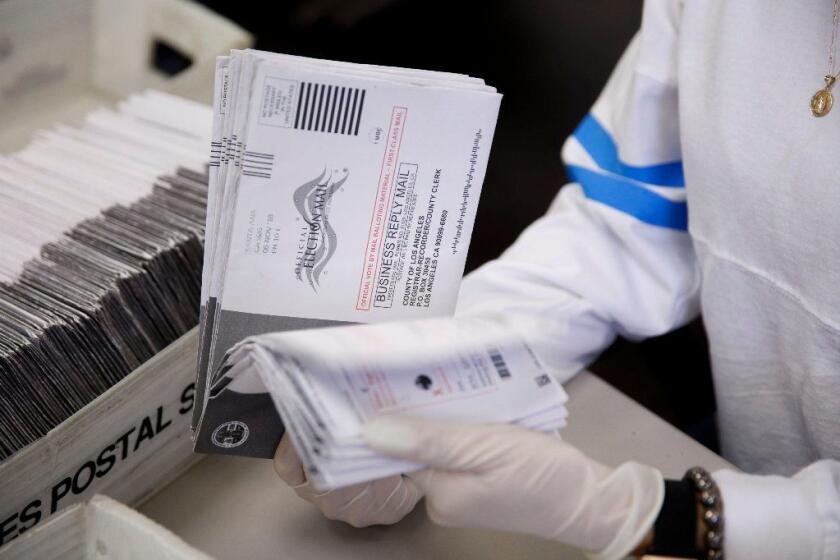Black women see Kamala Harris’ historic nomination as a moment of truth for the country
There was joy and there was disappointment.
As Kamala Harris formally accepted the nomination to be Joe Biden’s vice presidential running mate, some Black women felt a rush of pride. Others were dismayed that Harris had squandered her historic moment by failing to address the nation’s history of racism.
Bianca Evans saw herself as she watched the California senator talk about her family and her upbringing as a woman of Indian and Jamaican descent.
Like Harris, Evans, a 30-year-old law student at Temple University in Philadelphia, is a mixed-race Black woman with roots that go back to both Asia and Africa. Her father was born in Jamaica to parents who immigrated to the island from India, and her mother is a U.S.-born Black woman.
“Kamala is a reminder for Black and Asian women everywhere that we can surpass our ancestors’ wildest dreams,” Evans said.
But as Danielle Slaughter watched from her home in Atlanta, Jacinda Cason from hers in suburban Detroit and Kaleka Lewis-Harris from hers in Flint, Mich., they were all underwhelmed by Harris’ emphasis on her background and what they saw as her soft-pedaling on the issue of racism, in a year when police killings of Black people have sparked months of mass protests.
Joe Biden’s choice of Kamala Harris, a Howard University alum, is cause for celebration at HBCUs.
Cason, 47, says she feels somewhat protective of Harris because they both have African ancestry, but she expected Harris to work harder to speak to women like her in a more direct and raw way. She didn’t hear enough of her own story in Harris’ words.
“They know that Black women vote, but then they erase us from the conversation,” said Cason, who manages a program that funds organizations focused on registering voters in Michigan.
Black women represent the backbone of the Democratic Party, and these three wanted a more full-throated acknowledgement of their concerns.
Lewis-Harris used Black slang to express her own dissatisfaction: “You gotta come harder than that.”
All three women say they’ll vote for Biden and Harris in November. But their reactions to Harris show the tough road ahead as she tries to persuade supportive but skeptical Democrats that she can effectively champion causes that are important to Black voters, such as how to protect them from COVID-19, which has ravaged Black communities, climate change and pollution.
Lewis-Harris, a Flint city employee, coordinates free water distribution at three predominantly Black churches. Many residents there still fear drinking the tap water, six years after the discovery of widespread, potentially deadly contamination in the city’s municipal pipes.
She wants Harris to fight for clean drinking water and prevent future water disasters.
Lewis-Harris, 47, says 400 to 600 people line up for water at each location every week on the city’s predominantly Black north side. Many say they feel neglected and forgotten by elected officials.
Public safety is paramount to all three women, not just in terms of police brutality. All three say they fear that if President Trump loses, his most extremist supporters will target Black Americans, perhaps resorting to physical violence.
“I need them to stop using the ‘This isn’t America’ phrase” to describe the rise of racism, inequality, white supremacy and xenophobia under Trump, said Slaughter, a writer and diversity consultant development coordinator for the nonprofit Mothering Justice. The organization advocates for issues important to Black women, such as affordable child care, maternal health and education.
“I need them to be honest,” the 36-year-old said of Harris and the Democrats. “This is America at its worst. What are you going to do to fix it?”
The mix of celebration over Harris’ placement on the Democratic ticket and frustration that there’s still a disconnect between politicians and the Black community is something Sara Lomax-Reese has heard for the last week.
Lomax-Reese is president and CEO of Philadelphia’s WURD-FM Black talk radio station, and she says callers to her morning shows have been filling the airwaves with lively arguments about whether Harris, a former prosecutor, is the right Democrat to champion the causes of police accountability and mass incarceration.
Trump’s and Biden’s reactions to racial injustice and protests illuminate how they approached the issue of race throughout their political careers.
But she says other callers see in Harris a chance to make Biden, who’s prone to missteps of his own when talking about race, less “wobbly” on the issue.
“Yes, there are people who don’t like her record, but people see her as smart, courageous, really tenacious,” Lomax-Reese says.
“I’ve heard a lot of people say, ‘I can’t wait for the smackdown between her and [Vice President Mike] Pence.’”
Lomax-Reese says she can’t tolerate anyone in the Black community who says they don’t want to vote in November when so much is on the line and when the president is making false accusations about mail-in voting, specifically to drive down Black voter turnout.
If Trump prevails in November, she says, “The next four years could be catastrophic for Black people.”
She thinks that on balance, Harris will be an asset as Biden tries to keep that from happening.
“For the Democratic Party, it’s absolutely critical to the turnout in Philadelphia to offset the middle of the state,” where the population is whiter and more conservative, she says. “Having Kamala Harris on the ticket is an energizing force.”
COVID-19 has led to a push for vote by mail, but advocates face logistical and legal hurdles — and “rigged election” claims from President Trump.
More to Read
Get the L.A. Times Politics newsletter
Deeply reported insights into legislation, politics and policy from Sacramento, Washington and beyond. In your inbox three times per week.
You may occasionally receive promotional content from the Los Angeles Times.














